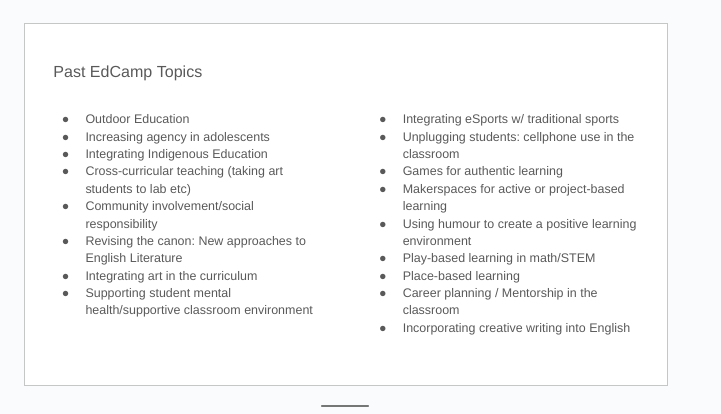This week in class we talked about Edcamps! Edcamps are a form of unconference designed specifically for educators. Unlike traditional conferences with predetermined schedules and speakers, edcamps are participant-driven events where the agenda is created on the day of the event by the attendees themselves. The name “edcamp” stands for “education camp,” reflecting the informal and collaborative nature of these gatherings.
Here are some key characteristics of Edcamps!
- Participant-driven agenda: Attendees propose session topics and vote on the topics that interest them the most. This democratic process ensures that the sessions are relevant and tailored to the participants’ needs and interests.
- Collaborative learning: Edcamps emphasize the power of peer-to-peer learning and collaboration. Sessions often involve discussions, hands-on activities, and sharing best practices among educators.
- Informal atmosphere: Edcamps typically have a relaxed and informal setting, fostering an environment where educators can engage in open conversations, ask questions, and share experiences without the formality of traditional conferences.
- Free or low-cost: Many edcamps are organized on a voluntary basis, and admission is often free or requires only a minimal fee to cover basic expenses. This accessibility encourages a wide range of educators to participate.
- Technology integration: Edcamps often explore the use of technology in education. Sessions may cover various tools, apps, and strategies for integrating technology into the classroom to enhance teaching and learning.
- Networking opportunities: Participants have the chance to connect with educators from diverse backgrounds, grade levels, and subject areas. The networking aspect of edcamps allows for the exchange of ideas and the building of professional relationships.
Edcamps vs. Pro-D days
Professional development days are pre-planned by school or district administrators and often include formal presentations or workshops on specific topics. The content is typically aligned with institutional priorities and educational initiatives. Pro-D days have a structured schedule, and attendance is usually mandatory for educators.
Comparison?
Edcamps stand out for their participant-driven, unconference format, promoting collaboration and individual choice. In contrast, professional development days are institutionally focused, with predetermined content and a more formal structure. Both types of professional development offer unique benefits, catering to educators’ diverse needs and preferences.
Past Edcamp Topics
Edcamps have consistently showcased the uniqueness and diversity of learning topics, catering to the varied interests and needs of educators across the spectrum. From innovative teaching strategies and technology integration to culturally responsive practices and social-emotional learning, past Edcamp sessions have covered a broad array of topics. This diversity ensures that educators, regardless of their subject area, grade level, or teaching experience, find relevant and engaging discussions that contribute to their professional growth, creating a dynamic and inclusive learning environment for all participants.

When you come to an Edcamp, what you’re going to see, experience, and feel is the connection with other teachers.
Edcamp: Empowering Educators Worldwide
